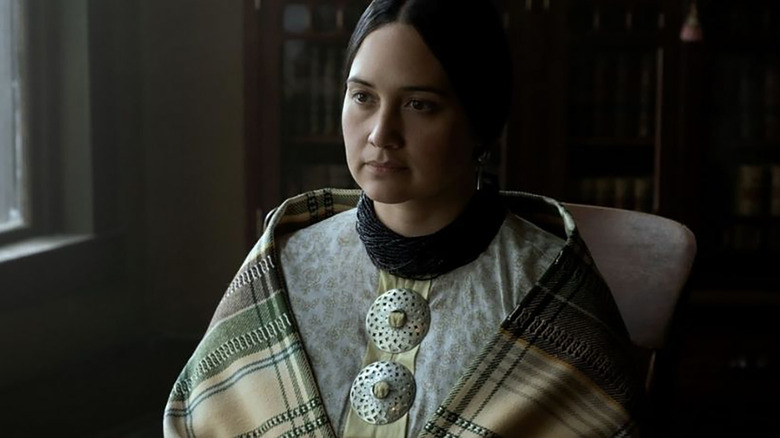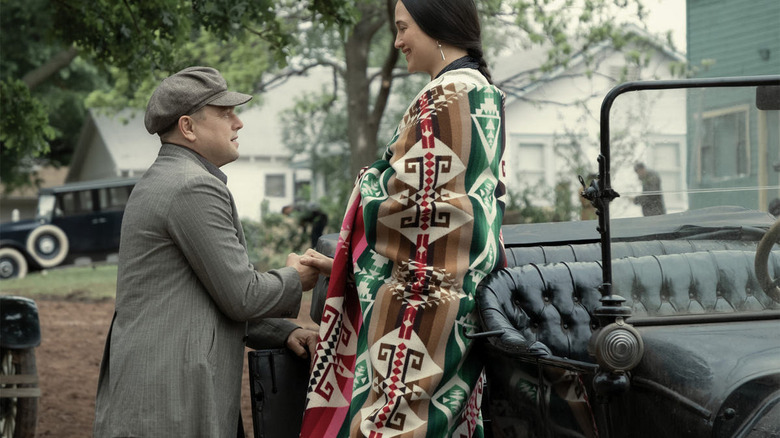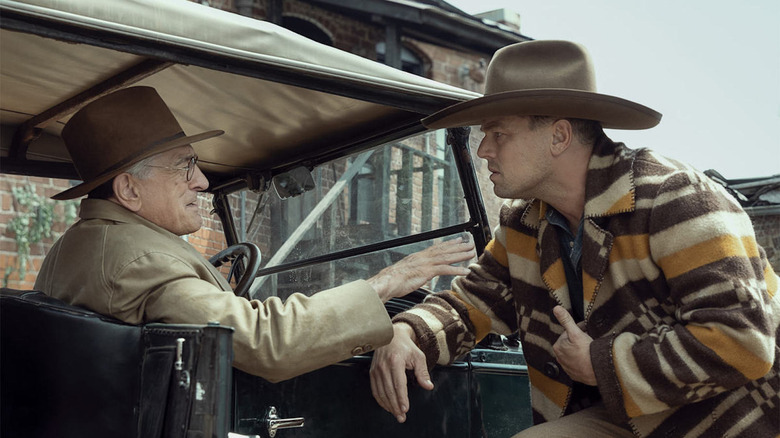Killers Of The Flower Moon Is, Unfortunately, Very Accurate To The Real Story
This article contains spoilers for "Killers of the Flower Moon."
It should not come as a news flash that America's pursuit of its manifest destiny necessitated the wholesale slaughter of the country's indigenous population. Every single celebrated aspect of American life exists because, over several hundred years, settlers hailing largely from Europe stole land. Multiple wars were fought to earn the right to wipe these people nearly off the face of the planet, and we should never, ever forget that everything we have is culturally counterfeit.
And in the final stages of this conquest, the architects of this theft exhibited an off-the-charts monstrousness that can be explained, but, for any decent human being, impossible to comprehend.
David Grann's "Killers of the Flower Moon" is a scalding read. As a piece of nonfiction, you know what you're getting into when you crack the spine: this is the tale of how white Oklahomans methodically murdered possibly hundreds of Osage people in the 1920s as a means of acquiring the headrights to the oil deposits discovered on their land. It is also a procedural. It's right there in the subtitle: "The Osage Murders and the Birth of the FBI." The narrative dovetails with the United States government's creation of a federal law enforcement unit (and, unintentionally, the installment of a bullying chieftain in J. Edgar Hoover). Grann's purpose is twofold, and, in a remarkably succinct 352 pages, he relates a crucial piece of history while leaving you shaking with rage.
A poisoned romance
Martin Scorsese's adaptation of Grann's book, which is now in theaters (and must be seen there), is anything but succinct. At 206 minutes, it tries to make sense of the monsters who perpetrated this unconscionable crime. And it destroys you because Scorsese refuses to portray his villains as one-dimensional cretins.
The horrible thing about Ernest Burkhart (Leonardo DiCaprio) is that he loved Mollie Kyle (Lily Gladstone), and she, in time, loved him. This is backed up in Grann's book, but there's a coldness to the telling. That's not Grann's fault. He's playing the role of historian, and lacks the dramatic license to invest the characters' courtship with the kind of warmth that would get us to buy into their union.
Scorsese, who shares a writing credit with Eric Roth (who reportedly departed the production when DiCaprio opted to play Ernest instead of lawman Tom White), has such license, but proceeds with admirable caution. Ernest is not your classic charmer. He's frankly pathetic, and the typically aglow DiCaprio plays this to shocking perfection. But there had to be some kind of connection for Mollie to fall for this grifter, and Gladstone gets us to understand her character's surrender.
Again, it happened. The historical record says it happened. It's just hard to grasp on the page. There had to be something to Ernest. Mollie didn't fall in love with a cipher. What's worse is that there had to be something to Ernest's uncle William Hale. Because this ungodly massacre doesn't happen without him.
This is, tragically, who we are
William King Hale was a reptile of a human being. He was a cattle rancher who feigned friendliness with the Osage in order to orchestrate the theft of their headrights. He considered Osage County in Oklahoma his manifest destiny. And when the indigenous population found oil on a patch of land our government hadn't seized from them, he put into play a disgusting conspiracy to drain them of every last cent.
Scorsese's greatest challenge with "Killers of the Flower Moon" is accounting for the existence of Hale. How could so many people fall under the spell of such a preposterously evil man? As the book and the film make distressingly clear, Hale was not a clever man. Everyone knew what was happening. And this is ultimately what makes the three-plus-hour experience of the film so harrowing: Hale is an avowed, unrepentant capitalist predator. He's going down for his wrongdoing, but he is our future.
Scorsese's film is a scathing historical document. Would I like to see another film told explicitly through the lens of the Osage? Absolutely. But Scorsese, working from Grann's scrupulous reportage, has given us a forensically/emotionally devastating condemnation of everything that is lamentable about the land Americans occupy every detestable day. And it is, however many hundred years later, an occupation. And you should never feel anything but awful about this.


